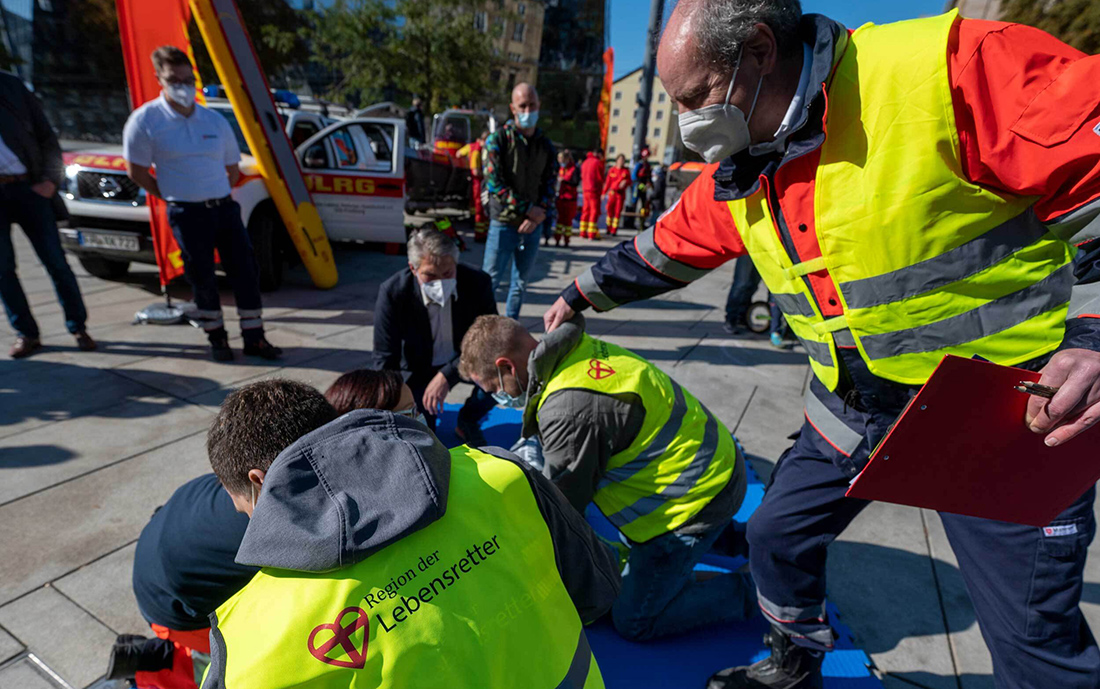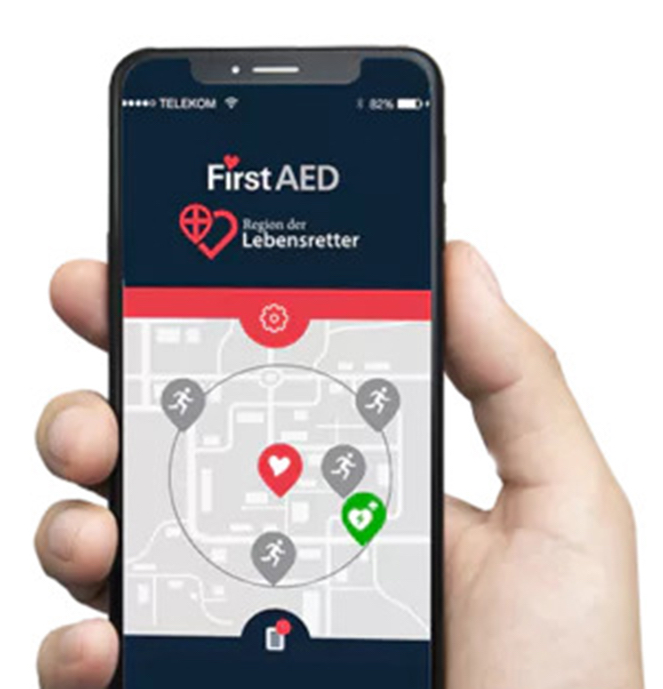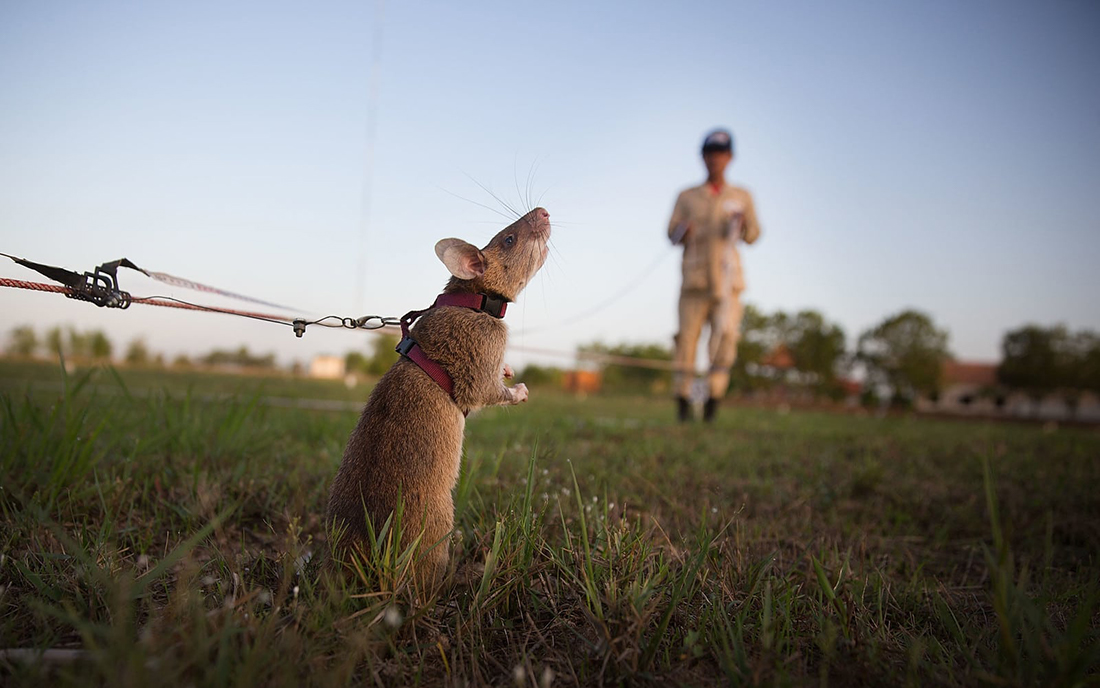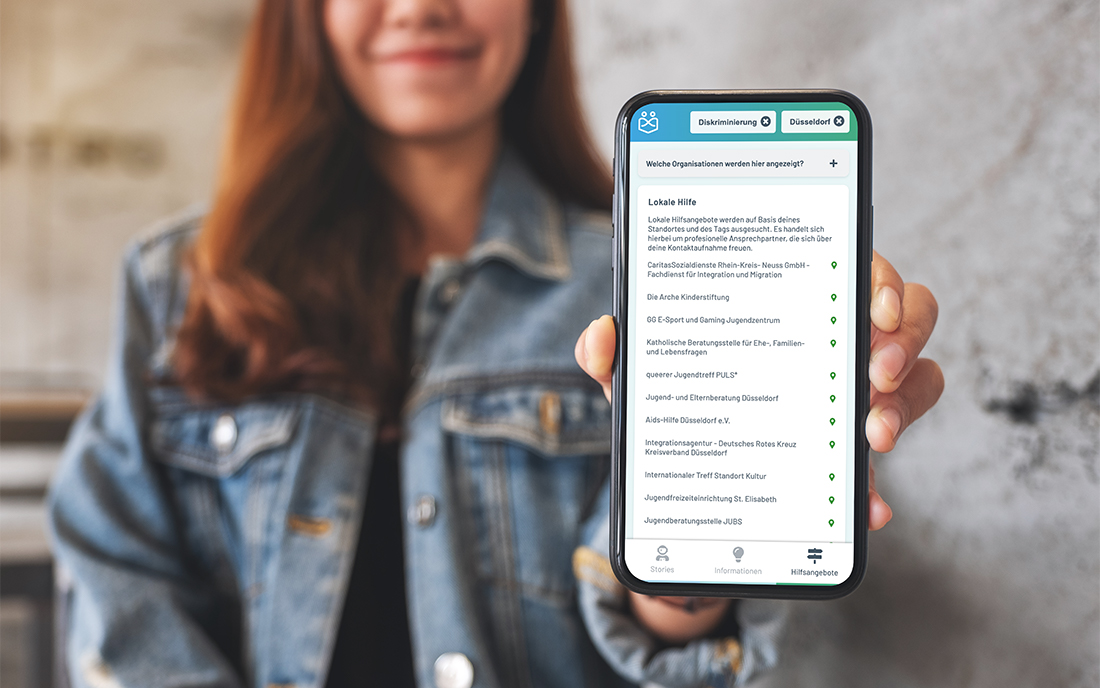Mission: Saving lives
 © Region der Lebensretter
© Region der Lebensretter
We present three extraordinary initiatives that thrive on the smart interaction between people and technology. All three pursue the same goal: saving lives.
The areas of application of the initiatives presented by us are wide-ranging: they range from the use of volunteers in acute medical emergencies, the use of professionally trained rats in earthquake emergency aid to a digital app that makes it easier for suicidal young people to find support and accept help in crises.

FirstAED | Region of Lifesavers – Instant notification of nearby first responders
Sudden cardiac death is one of the most common causes of death in Germany and can affect anyone, regardless of age or fitness level. The emergency services often arrive quickly – in large cities around 6-9 minutes after the emergency call, in rural areas much later – and yet the chances of survival are low. This is because the first four minutes of a cardiac arrest are crucial, as irreversible damage to the brain occurs immediately and only around 10-15 percent of patients survive at all. However, if vital measures are started in the first four minutes, the chances of survival double to quadruple.
Shortening this resuscitation-free interval to a minimum has been the goal of the non-profit Freiburg-based organization Region of Lifesavers since 2018. In collaboration with regional aid organizations, fire departments and control centers, emergency physician Michael Müller in Freiburg has launched a smartphone-based system built upon the FirstAED alerting app developed in Denmark in 2014. This system involves qualified first responders. From then on, when an emergency call is received with a diagnosis of cardiac arrest, registered first responders who are in the immediate vicinity at the time are also alerted by smartphone simultaneously to the ambulance. These professional first responders can keep the patient alive for the first 3-5 minutes with chest compressions, artificial respiration or defibrillation until the ambulance arrives.
A recent evaluation shows that the average response time has been reduced by almost half. This combination of innovative and state-of-the-art smartphone technology complements existing emergency call systems and is continually being further developed. As part of the “Rettungskette5G/Rescue chain5G” project funded by the Federal Ministry of Transport, the system had been set up into the most modern first aid system in 2022. Its success is based on the voluntary commitment of medically trained personnel. This approach has proven its worth and the Region of Lifesavers, awarded the German Prize for Emergency Medicine in 2023, is currently the fastest-growing system in the world.
 © APOPO / HeroRats
© APOPO / HeroRats
HeroRats – Rats detecting landmines
The new field of activity of Apopo, the organization founded by Bart Weetjens in Belgium, is disaster relief after an earthquake: the detection of buried victims as an addition to the globally proven detection dogs. The teams of helpers benefit not only from the small size of the rats but also from their agility, as only they can quickly and easily enter cavities in the ruins through tiny openings and their unerring instinct guides them out of any labyrinth. The rats are now even equipped with a backpack containing equipment that can be used to contact the teams of helpers outside if they find survivors.
It all started with a key experience: as a teenager, Weetjens noticed the incredibly keen sense of detection of his pet rats and realized how well they could be trained. The Apopo success story began with the training of African giant rats to detect landmines quickly and reliably. They are too light to trigger mines and work many times faster than other methods. As a result, the high number of victims in Cambodia, the country with the most landmines in the world, has been significantly reduced. The docile rats are now also being used successfully in medical laboratories to diagnose tuberculosis at an early stage. TB is the second most common cause of death worldwide after COVID-19: the rats can recognise the pathogens more quickly and are more cost-effective than conventional technological methods. As TB is very easily transmitted, it saves lives every day.
 © Between the Lines
© Between the Lines
Between The Lines – Crisis support for young people via smartphone
Young people have many worries – from arguments with friends to heartache, stress with family, bullying at school to drug problems or suicidal thoughts – (unfortunately) everything is included. The psychological stress experienced by children and young people has increased alarmingly during the coronavirus pandemic. The problem is that those affected don’t always have someone to talk to about it. Even less often do they know where they can get help. The barrier to picking up the phone and calling the telephone counselling service is high.
The award-winning app Between the Lines, initially launched by Nick Wüsthoff and Oliver Kröger as a volunteer project, addresses precisely this issue. It is a digital form of youth support – free of charge, ad-free and, above all, anonymous. It scores above all with its low-threshold offering, which reaches all smartphone generations. The app identifies relevant organizations and offers help in the user’s immediate vicinity. Between the Lines provides comprehensive information and guidance on 31 topics. The service is completed by so-called heroic stories that show that everyone is ok – just as they are. This makes the app a strong proposition even when there is no acute emergency or the concerns are still too vague to specifically ask for help from an existing organization. The app is currently configured for several cities and municipalities, particularly in North Rhine-Westphalia, and will be successively expanded regionally.
MORE ABOUT THE PROJECT

FirstAED (Region of Lifesavers)
We are supporting FirstAED/Region of Lifesavers in November 2023 with the proceeds from GOOD. Find out more on our project page:
Questions, Critique, Ideas? Message us!
Andreas Renner, Co-Founder GOOD: andreas@good-search.org

